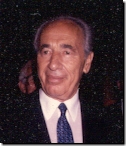| 
Shimon Peres
| CENTER FOR MIDDLE EAST PEACE
Proposed Red-Dead Canal
Seen as Peace Initiative By RAPHAEL ROTHSTEIN  HEY’RE not calling it a canal this time around, but a long, water-filled trench by any other name is certainly a “canal.” They’re saying it will be a “Peace Conduit.” Maybe it’s because of the ill-fated Mediterranean-Dead Sea Canal project of almost 20 years ago. Once highly touted, that scheme is barely remembered now, unsung and unwept. HEY’RE not calling it a canal this time around, but a long, water-filled trench by any other name is certainly a “canal.” They’re saying it will be a “Peace Conduit.” Maybe it’s because of the ill-fated Mediterranean-Dead Sea Canal project of almost 20 years ago. Once highly touted, that scheme is barely remembered now, unsung and unwept.
So they’ve got a new name – conduit – with its unfortunate suggestion of industrial waste and sewage. The route is planned to stretch through the Arava valley, from the Dead Sea to the Red Sea. The concept has been around for a while. Originally it was based on the geographical fact that the Dead Sea lies 1,200 feet below sea level. The difference in height in regard to the Red Sea would allow for a waterfall to generate hydro energy for desalination and electricity, much like the effect of the world’s great waterfalls and dams. The current scheme takes into account the power project, but emphasizes the environmental benefit, namely, replenishing the Dead Sea, which is dying from a rapidly declining water level. Saving the Dead Sea would restore the ecological balance and help tourism development in the region. Always the optimist, Israel Foreign Minister Shimon Peres told a recent conference of the Center For Middle East Peace and Economic Cooperation that the proposed canal would alleviate the serious water shortage affecting Israel, Jordan and the Palestinian areas and would be a step toward peace in Israel’s neighborhood. Jordan, which shares the Dead Sea with Israel, approved the plan and is involved commercially and diplomatically. Thus Israel, Jordan and the Palestinian Authority would receive sorely needed fresh water. According to well-informed sources, some serious German investors are already lined up for the multimillion-dollar program. Elaborating his vision of the projected canal, Peres said it would lead to a “transformation” alleviating the region’s water shortage – a solid advance towards peace. Asked if such a grand scheme could go forth in the current atmosphere of violence, Peres said it must for the sake of the future. “Terrorism,” he said, “is an intervention from the past.” He cited the Suez Canal and its far-reaching benefits over a century ago and recalled that the Verdi opera, Aida, “which was commissioned for the Suez’s opening, stands as a lasting legacy of beauty from that great unifying project.” “Water knows nothing of politics – it flows for all,” Peres added. |